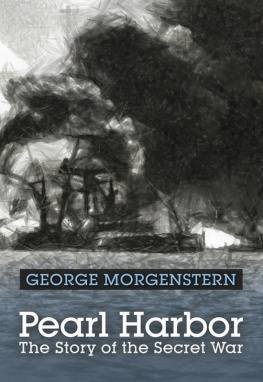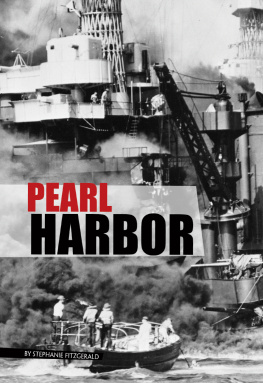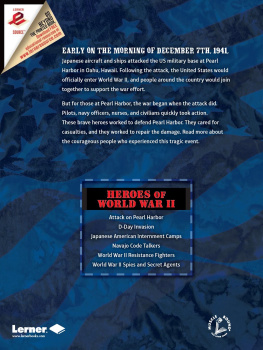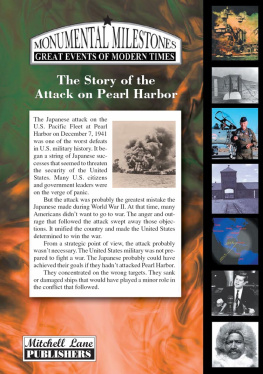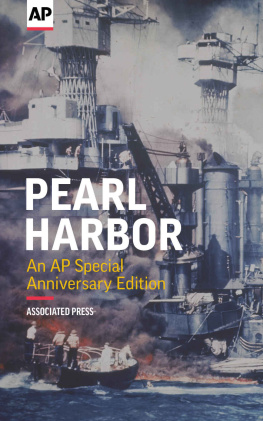George Morgenstern - Pearl Harbor: The Story of the Secret War
Here you can read online George Morgenstern - Pearl Harbor: The Story of the Secret War full text of the book (entire story) in english for free. Download pdf and epub, get meaning, cover and reviews about this ebook. year: 1947, publisher: Toe Devin - Adair Company - New York, genre: History. Description of the work, (preface) as well as reviews are available. Best literature library LitArk.com created for fans of good reading and offers a wide selection of genres:
Romance novel
Science fiction
Adventure
Detective
Science
History
Home and family
Prose
Art
Politics
Computer
Non-fiction
Religion
Business
Children
Humor
Choose a favorite category and find really read worthwhile books. Enjoy immersion in the world of imagination, feel the emotions of the characters or learn something new for yourself, make an fascinating discovery.
- Book:Pearl Harbor: The Story of the Secret War
- Author:
- Publisher:Toe Devin - Adair Company - New York
- Genre:
- Year:1947
- Rating:5 / 5
- Favourites:Add to favourites
- Your mark:
- 100
- 1
- 2
- 3
- 4
- 5
Pearl Harbor: The Story of the Secret War: summary, description and annotation
We offer to read an annotation, description, summary or preface (depends on what the author of the book "Pearl Harbor: The Story of the Secret War" wrote himself). If you haven't found the necessary information about the book — write in the comments, we will try to find it.
Pearl Harbor: The Story of the Secret War — read online for free the complete book (whole text) full work
Below is the text of the book, divided by pages. System saving the place of the last page read, allows you to conveniently read the book "Pearl Harbor: The Story of the Secret War" online for free, without having to search again every time where you left off. Put a bookmark, and you can go to the page where you finished reading at any time.
Font size:
Interval:
Bookmark:
PEARL HARBOR
HARBOR
The Story of the Secret War

GEORGE MORGENSTERN

1947 - Toe Devin - Adair Company - New York

COPYRIGHT 1947 by George Morgenstern. All rights reserved. No part of this book may be reproduced in any form without permission in writing from the publisher, except by a reviewer who may quote brief passages or reproduce not more than three illustrations in a review to be printed in a magazine or newspaper. Manufactured in the United States of America.
PUBLISHED JANUARY, 1947
But one of the weightiest objections to a plurality in the Executive, and which lies as much against the last as the first plan, is that it tends to conceal faults and destroy responsibility. Responsibility is of two kindsto censure and to punishment. The first is the most important of the two, especially in an elective office. Man, in public trust, will much oftener act in such a manner as to make him obnoxious to legal punishment. But the multiplication of the Executive adds to the difficulty of detection in either case. It often becomes impossible, amidst mutual accusations, to determine on whom the blame or the punishment of a pernicious measure, or series of pernicious measures, ought really to fall. It is shifted from one to another with so much dexterity, and under such plausible appearances, that the public opinion is left in suspense about the real author. The circumstances which may have led to any national miscarriage of misfortune are sometimes so complicated that, where there are a number of actors who may have had different degrees and kinds of agency, though we may clearly see upon the whole that there has been mismanagement, yet it may be impracticable to pronounce to whose account the evil which may have been incurred is truly chargeable.
I was overruled by my council. The council were so divided in their opinions that it was impossible to obtain any better resolution on the point. These and similar pretexts are constantly at home, whether true or false. And who is there that will either take the trouble or incur the odium of a strict scrutiny into the secret springs of the transaction? Should there be found a citizen zealous enough to undertake the unpromising task, if there happen to be collusion between the parties concerned, how easy it is to clothe the circumstances with so much ambiguity, as to render it uncertain what was the precise conduct of any of those parties?
THE FEDERALIST (No. 70)Alexander Hamilton.
THIS BOOK is intended to give the facts and examine the meaning of Pearl Harbor. The facts have come to the American public in disjointed form, from many sources, and with many interpretations, over a period of four and one-half years.
Pearl Harbor is already a chapter in history. Historians of World War II cannot escape its implications. At this date, so soon after the end of a victorious war, there has been a reluctance to appraise these implications. The mores of a victorious nation dictate that the whole of the war guilt be attached to the defeated adversary. Pearl Harbor, as a study of war origins, is thus a national embarrassment.
For the United States World War IIthe most unpopular war in history, to use the apt descriptive phrase of Lieut. Gen. Hugh A. Drumofficially began December 7, 1941, with the Japanese attack upon Pearl Harbor. The assault which brought America into the war was the greatest naval disaster in American history. It was originally investigated solely as a failure of the commanders of the fleet and garrison at Hawaii. As more and more facts came to light, it became clear that any balanced study of the events of December 7 could not be thus restricted.
Pearl Harbor was the terminal result of a complex of events moving in many parallel courses. National ambition and international intrigue, diplomacy, espionage, politics, personalities, and the personal responses of men to crisisall of these were of equal or greater importance than purely military considerations. Finally, Pearl Harbor reduced itself to a study of the reasons for which the United States was taken to war, the methods by which it was taken to war, and the motives of those who determined that course.
Of some dozen investigations and studies of Pearl Harbor, most were plainly partisan, undertaken either in defense of President Roosevelt and his administration or of certain members of the civil government or of the Army and Navy high command.
An inquiry by Army intelligence for Mr. Roosevelt was so secret that its existence is known only by hearsay. A second investigation was authorized but never occurred. Col. Charles W. Bundy and Lieut. Col. George W. Ricker of the War Department general staff, who were commissioned to undertake the project, were killed while flying to Hawaii when their plane crashed December 12, 1941, in the Sierra Nevadas near Bishop, California.
Other investigations and studies were conducted by the late Secretary of the Navy Frank Knox, by a Presidential Commission headed by former Associate Justice Owen J. Roberts of the United States Supreme Court, by an Army Board of Inquiry, by Adm. H. Kent Hewitt, by Maj. Gen. Myron C. Cramer, Army judge advocate general, by Maj. Henry C. Clausen, by Col. Carter Clarke, and by a Joint Congressional Committee.
Throughout these investigations the administration was in a strategic position, because of its control of Congress and the executive departments, its control of records, its influence on rank and status in the services, its power to initiate investigations, to appoint the investigators and counsel, to define the limits and control the course of the investigations, and, during the war and the continuing period of emergency, to exercise powers of censorship.
The administration has done its utmost to discourage examination of the acts and intentions of the men who were in the vanguard of the march toward war. It has suppressed relevant documents and permitted important papers to disappear or be destroyed. It has even sought legislation which, on threat of penal confinement and heavy fines, would have forbidden discussion of the vital intelligence which came into its possession as a result of penetrating the Japanese code.
There could be no guaranty of impartiality and disinterestedness when men who were in the position of defendants were empowered to investigate and to appraise their own conduct and that of their close associates. This generalization is particularly applicable to a political party which is in the process of canonizing a party leader whose name has had a peculiar efficacy in maintaining that party in power.
Mr. Roosevelt was at pains to protect his reputation and political tenure by forestalling any thorough examination and report during his lifetime. When the Army Pearl Harbor Board submitted embarrassing findings six months before his death, his Secretary of War, resorting to the pretext of national security, used the censorship to suppress the entire report for ten months. When, after both Germany and Japan were defeated, the report was finally released, 52 pages of it were still suppressed. They were made public two and one-half months later, when the hearings of the Joint Congressional Committee provided a convenient diversion to obscure their meaning.
Next pageFont size:
Interval:
Bookmark:
Similar books «Pearl Harbor: The Story of the Secret War»
Look at similar books to Pearl Harbor: The Story of the Secret War. We have selected literature similar in name and meaning in the hope of providing readers with more options to find new, interesting, not yet read works.
Discussion, reviews of the book Pearl Harbor: The Story of the Secret War and just readers' own opinions. Leave your comments, write what you think about the work, its meaning or the main characters. Specify what exactly you liked and what you didn't like, and why you think so.

